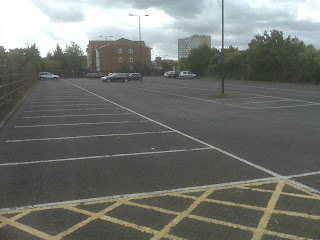I was going to write a post lambasting the government's latest U-turn-in-the-making, the National Planning Policy Framework. But the Telegraph (along with countless others from right across the political spectrum) has already done a pretty good job, pointing out that with weak planning laws the UK could end up with urban sprawl like Ireland or Los Angeles.
And with urban sprawl you get more car-dependency because public transport doesn't work with low-density housing. It's bad enough in subsurban areas like Merton.
Paradoxically, it's car dependency that also eats up prime development land in towns and cities. In central Wimbledon there are two large Council-run car parks, plus ones at Centre Court and Sainsburys. The council car parks would be worth millions as development sites, and could provide housing located ideally for the town's public transport links.
The other effect is car-dependency creates areas where people don't want to live. Busy roads not only consume land for the carriageway, they also form a blighted corridor where noise, road danger and pollution mean people don't want to live or shop there. That's why the urban motorway of central Morden is such ghost town.
Yet a lot of the time car parking isn't even used. Above is a picture of the Kenley Road car park in Morden, taken on a Monday lunchtime. A handful of cars. Yet the council, rather than looking at under-used assets like this, want to extend Dundonald School onto a much-loved local park (Dundonald Recreation Ground), into the teeth of local opposition, in an area hardly blessed with a surfeit of green space.
Councils and the government need to wake up to the fact that there is usable urban land, but it can't be wasted on cars to the extent it is. It would be great if we lived in a country where there was plenty of cheap land and plenty of cheap oil, on a planet where a bit of CO2 would just warm things up nicely without causing extreme weather events, famines, and so on. Then we could build enough houses and lots of roads and drive everywhere. Unfortunately we live on a small, crowded island where land is in short supply, where oil is expensive, on a planet where climate change is a grave threat.
With that in mind, we have to ask ourselves whether we put housing first or cars first. Car parks do not pay their way in social terms, or even in terms of narrow economics: given the potential market value of a central Wimbledon plot, drivers are being massively subsidised.
The alternative is pretty simple. Communities that rely on public transport walking and cycling and less on cars enjoy a better local environment, have higher housing density yet feel less cramped and less urbanised, and are greener than car-oriented developments. Plus they are safer and healthier places because people get more excercise as part of daily life, and are exposed to less road danger and pollutants. They are also likely to be stronger communities.
Friday, September 16, 2011
Subscribe to:
Post Comments (Atom)


No comments:
Post a Comment